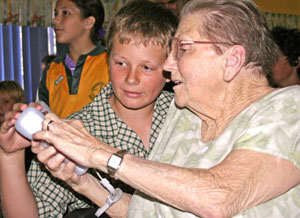
A Blue Care evaluation report has revealed widespread enthusiasm among staff about the physical and psychosocial benefits of Nintendo Wii use in aged and community care services.
Data collected from 53 Blue Care services throughout Queensland and northern New South Wales has shown young disabled clients and able elderly clients benefit most from the use of the technology.
Blue Care Business Improvement Officer (Best Practice) Dr Helen Higgins said the not-for-profit organisation decided to evaluate the use of Nintendo Wiis by clients in its nursing homes, respite centres and community care centres after the technology was introduced in mid 2008.
“One of the most interesting outcomes of the evaluation was the agreement and enthusiasm among staff about the physical and psychosocial benefits of using Wii, particularly with young disabled clients and with able older clients,” Dr Higgins said.
“The benefits of such technology have been noted in research literature before, but mostly in young disabled populations within educational settings, not so much in aged and community care.”
The literature suggests that the therapeutic use of Wii technology can have a positive effect on self-esteem, memory, concentration and social interaction.
“Wii games can be used in a graded fashion to enhance physical functioning such as range of motion, stability, balance, weight bearing, movement and coordination, and visual tracking,” Dr Higgins said.
“The technology also allows elderly people the opportunity to perform virtual activities they can no longer manage in reality which helps them identify with their former-self. The activities can also provide an opportunity for social interaction and a sense of community.
“Our report found that Blue Care services were using Nintendo Wiis in structured programs and for group and individual activities, with the most popular game being ten-pin bowling.
“We found that the highest demand for the use of Wii activities came from centre-based respite services with 42 per cent of services purchasing additional equipment to support the activities.”
Blue Care is now considering forming a Wii user group to help Wii users become more informed and hopes to create some organisational guidelines regarding the use of Wii or similar technologies.
“We recognise the importance of assessing each client’s condition and abilities before their involvement in any Wii program as different games may suit particular client groups,” Dr Higgins said.
“We also understand that staff supervision and training is important to ensure clients benefit to the fullest degree from such technology.”
Blue Care will present the findings of its Wii evaluation report at the International Health in Transition Conference in Adelaide in August.
Photo : A school student teaching a Blue Care resident of Yurana Aged Care Facility, Springwood Qld, how to play Nintendo Wii ten pin bowling. Photo courtesy of Blue Care
 JourneyOnline
JourneyOnline






